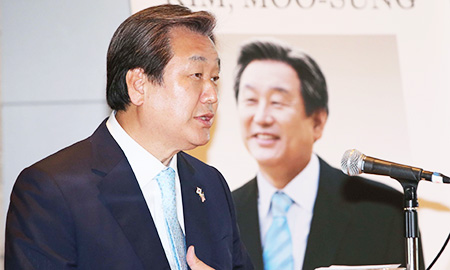- California Assembly OKs highest minimum wage in nation
- S. Korea unveils first graphic cigarette warnings
- US joins with South Korea, Japan in bid to deter North Korea
- LPGA golfer Chun In-gee finally back in action
- S. Korea won’t be top seed in final World Cup qualification round
- US men’s soccer misses 2nd straight Olympics
- US back on track in qualifying with 4-0 win over Guatemala
- High-intensity workout injuries spawn cottage industry
- CDC expands range of Zika mosquitoes into parts of Northeast
- Who knew? ‘The Walking Dead’ is helping families connect
Ruling party chief’s pro-US remarks stir up controversy

Saenuri Party Chairman Rep. Kim Moo-sung gives a special lecture at Columbia University in New York, Wednesday. (Yonhap)
By Kang Seung-woo
South Korea’s ruling party Chairman Kim Moo-sung is taking flak for remarks he made about Korea’s relations with the United States and China during his U.S. trip.
Diplomatic experts say that it was not appropriate for Kim to openly make such a remark, citing an apparent lack of diplomatic sense.
“The United States is more important than China to Korea,” Kim said during a press conference with Korean correspondents in Washington, D.C., Monday.
“Kim only had to stress the importance of the ROK-U.S. alliance,” said Kim Yeoul-soo, an international relations professor at Sungshin Women’s University.
“He should not have made a remark that may provoke China because it is also a diplomatically important partner to us.”
China has surpassed the U.S. as the Korea’s No. 1 trading partner.
Kim added: “The politician’s imprudent remark has overshadowed his achievements during the U.S. trip.”
The chairman, now on a visit to New York, the second stop on his U.S. trip, has met with high-profile politicians and government officials, vowing efforts to boost the 62-year-old bilateral alliance.
His remarks came while relations between Seoul and Beijing may be at their best-ever, as evidenced by President Park Geun-hye’s five summits with Chinese President Xi Jinping since her inauguration in February 2013, compared with four between Park and U.S. President Barack Obama. In addition, Korea has joined the China-led Asian Infrastructure Investment Bank (AIIB), to which Washington is opposed.
Amid the stronger Sino-Korea ties, there is speculation that the U.S. government is complaining about Korea’s infatuation with China.
Park Won-gon, an international studies professor at Handong Global University, said that Kim views Korea’s ties with the U.S. and China from a zero-sum perspective.
“It would have been better wording if he said he would make efforts to advance relations with China, based on the solid ROK-U.S. alliance,” Park said.
“He need not have comparatively mentioned China.”
The incident also draws comparisons with President Park and Kim.
Last September, Cheong Wa Dae issued a press release ahead of Park’s meeting with heads of U.S. think tanks in New York and it said it was an misunderstanding that the Korean government is excessively leaning toward China in an effort to show Seoul’s commitment to the alliance.
However, Park decided to leave out the sensitive wording after taking into account a possible complaint from Beijing.
“Compared with President Park, Kim is less strategic in terms of diplomacy and his diplomatic skills are not as high,” Kim Yeoul-soo said.
The professors said that although an angered Chinese government will not overtly complain about Kim’s remarks, it will keep then in mind.
The ruling party explained that his remarks did not intend to disregard China.
“There are some voices in the U.S. that the Korean government is diplomatically leaning toward China, so Kim said so to ease the concerns to an extent,” said Rep. Chang Yoon-seok of the Saenuri Party, who accompanied the chairman.
“It is not a matter of choosing between the U.S. and China, and Kim’s remarks do not mean China is not important to Korea.”















